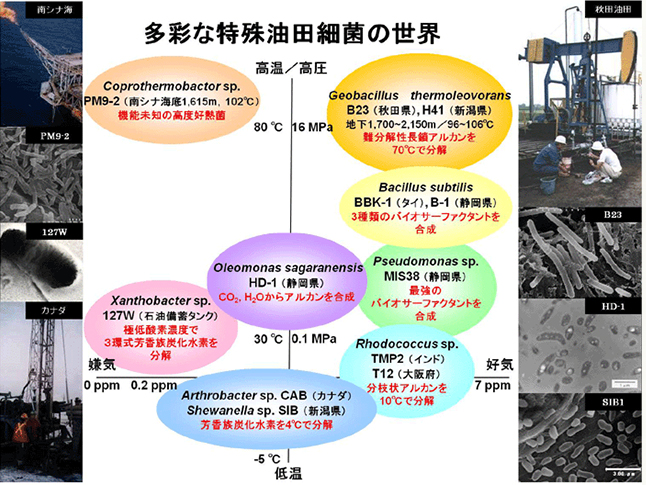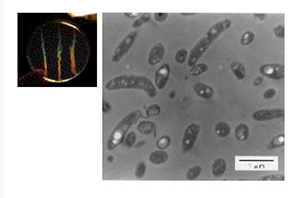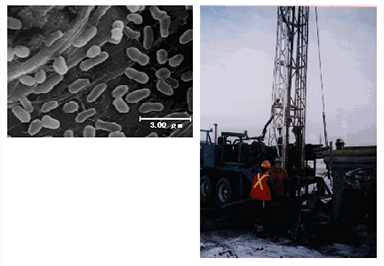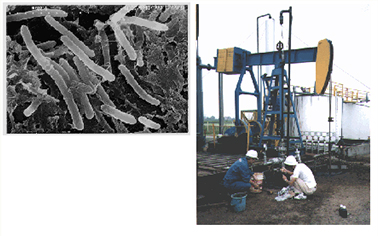Oil field bacteria
We have isolated and characterized a number of oil field bacteria. Their special activities will be useful for bioremediation technology.
Fig. Diversity of oil field bacterial collection
Oleomonas sagaranensis HD-1
There was Sagara oil field in Shizuoka prefecture, Japan. The crude oil from Sagara oil field was composed of medium chain alkanes, while that from Middle-East Asia was composed of polycyclic aromatics, cyclic alkanes, resins, and asphaltens. We successfully isolated Oleomonas sagaranensis HD-1 gen. nov [6, 55](Fig. 1). HD-1 was suggested to be a mixotrophic bacterial strain that was capable of producing alkane from CO2 by utilizing 14C tracer experiments [17].
Shewanella sp. SIB1
We have isolated a psychrotolerant Shewanella sp. SIB1 from a petroleum reservoir [37](Fig. 2). This strain was capable of degrading catechol at 4˚C condition. We were interested in the molecular mechanisms of strain SIB1 for cold temperature tolerance. We found that the production level of a peptidyl prolyl cis-trans isomerase (PPIase) was significantly increased at low temperature conditions [62]. This fact suggests that PPIase in strain SIB1 is one of the important enzymes for proper folding of cellular proteins under low temperatures.
Geobacillus thermoleovorans B23
Geobacillus thermoleovorans B23 is an extremely thermophiles that has been isolated from 2,150 m depth of oil field in Minami Aga, Niigata, Japan [40, 41](Fig. 3). Strain B23 is capable of degrading solid alkanes (C20<) at 70˚C condition. It was found that superoxide dismutase (SOD) and catalase were specifically produced upon degradation of alkanes. This observation is also reported for peroxisome in eukaryotic cells including Yeasts, suggesting their evolutionary lineage. Recently, the draft genome sequence was analyzed for strain B23. It was found that strain B23 genome harbors three tandem alkane monooxygenase genes, ladAa, ladAb, and ladB. [99]All these three genes were demonstrated to be functional in a mesophilic Pseudomonas fluorescens.
Xanthobacter polyaromaticivorans 127W
Hydrocarbons are extremely reduced compounds. Initial microbial degradation of hydrocarbons is generally oxygenation by monooxygenase or dioxygenase. We isolated Xanthobacter polyaromaticivorans 127W that can degrade naphthalene under microaerobic condition such as 0.2 ppm O2(Fig. 4). The dioxygenase from 127W had indeed high affinity to oxygen by three to five folds. Strain 127W is expected to be useful for degrading polycyclic aromatic hydrocarbons in the condition where air injection is difficult [61, 70, 74, 79].





